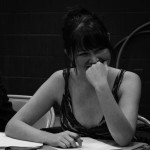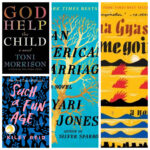
Theater is such an interesting monster. It’s a place where discussions can happen while a story forms around them. It’s a place where we not only suspend our disbelief, but accept it as fact… for at least the runtime of the show. It’s a place where, in the most intimate of venues, we are close to the stranger of bedfellows. Some of us, we live for innovative and bold theater. Theater that pushes the boundaries of what we know as formula, and create a fascinating piece for the stage. The majority likes the more formulaic and safe of theater experiences, knowing that they will be entertained and will not have to get themselves out of their comfort zone. Plays like “Motherf**ker With The Hat” take this notion of the domestic drama and changes the setting. This permits them to have a different flavor, to freshen up an old trope, and give us something new. Then there are plays like “Rapture, Blister, Burn,” a hilarious and often sad play written by Gina Gionfriddo, in which the formula is embraced and then expanded until the old domestic drama is progressed and ultimately becomes unique.
The play is a reflection of what it is like to look back after a life has been built and ask ‘what if?’ At the center of that reflection, and not as obvious at first, there’s the question of which type of woman am I? These two questions are the foundation in which feminism and traditionalism are explored by three different generations of women. Catherine and Gwen are at odds as they live in their forties. Years ago, Catherine left town and became a successful feminist writer who has been on TV. Having done that, she destroyed any chances of a real relationship. Gwen, who was Catherine’s roommate, stayed behind and married Catherine’s ex-boyfriend, Don. Now thirteen years later, Catherine comes back into their lives and it triggers a series of events in which questions are answered and the hard truth is shown.

In the middle of the love triangle, there’s a class about feminism that pits the two ideas of what a woman should be against one another. Gwen has lived a full, traditional family life, and even if she is miserable, this is her accomplishment. Catherine finds herself wanting that instead of the freedom that has made her a success, but left her empty. This is where the real meat of the story is, and the play itself doesn’t get scared of putting everything in the line. Because of this, the conversation about being a woman in our society gets faces, real faces, and we’re confronted with contradictions and themes we may have never talked about. Where else can you have the ideas from Schlafly and Friedan co-exist in one room with both making sense to each other? That’s how well written this play is. These characters could have been ideas discussing each other in form of people, but the words and the performances make these ideas actually human. It amazes me when the plot is really just background noise for the conversation, but it never feels like it. Instead, we are enthralled by the relationships, but caught up in the bigger picture, which is revealed through a class. This gives you both your traditional structure while changing the conservative approach, giving audiences a show hard to not fall in love with.
The Tongue in Cheek Theater production of “Rapture, Blister, Burn” revived a show which feels both light and relevant. It is in its lightness that they make you feel safe to listen, and then they put you right in the middle of what the main question really is. It is a great choice for an intimate night in NYC, and this was the right crew to put it up. I have to say, what a satisfying production.
Out of 4 stars:









